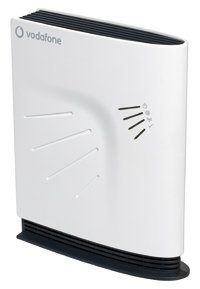
Vodafone Sure Signal
- Made by Alcatel Lucent, Vodafone's Sure Signal box is what the industry terms a "femtocell" - essentially a mini cellsite.
- It's roughly the size of a modem, and sits inside your home, or business, rerouting cellphone calls to your landline broadband connection
- A business version, which beams a 3G signal over a 40m radius and supports up to 8 cellphones, costs $1033.
- A home version (pictured), which beams a 3G signal over a 20m radius and supports up to 4 cellphones, costs $349 (a $99 launch deal applies until March 15).
- There's a 14-day moneyback guarantee if it doesn't work at your place.
- Requires a Vodafone broadband landline (won't work wiht other ISPs)
- Visitors phones can use a Sure Signal too, but only devices with a Vodafone SIM can connect
- Connection is automatic.
- Calls, txt and data are charged at the normal rate for your mobile plan; DSL data is unmetere
Vodafone helicoptered journalists to Bethells Beach to show of its new Sure Signal product, a gadget you can place in your home, or business, to boost poor mobile phone reception.
A real-life local couple was chosen to demonstrate Sure Signal, which has been on the market for a couple of weeks.
A remote west coast beach was a nice, uncontroversial place for the demo. It’s a location where nobody expects good cell service from any carrier.
They should have come to my place.
I happen to get lousy reception from Vodafone (and, unlike the tormented couple in the promo video below, whom you’ll notice has tried a bunch of different handsets, one conspicuously badged Telecom), I do get good reception from other carriers.
That’s not to bag Vodafone. Reception is a function of how close you are, and how many obstacles lay inbetween, you and the nearest celltower operated by your mobile provider. In another property, I could just as easily get strong Vodafone reception, but a weak XT or 2degrees signal.
And the official video (above) deserves points for honesty. It unashamedly addresses the fact that some homes have terrible reception. That’s just a fact of life. Especially given so many moan about poor reception in the same breath they object to any phone company planting a new celltower in their neighbourhood. So good on Vodafone for addressing the problem squarely with Sure Signal.
But here’s the thing.
Sure Signal - essentially a mini 3G cellsite - works by connecting your cellphone (and the cellphone of anyone who visits your home or work) to your landline broadband connection.
But if you want to plonk a Sure Signal box in your home (or work), your landline broadband account must be with Vodafone. Now, again I can see some logic here.
Alas, I was unable to attend the launch, but I checked in with Geekzone’s Maurcio Freitas, who told me Vodafone put forward various arguments for tying Sure Signal to one of its landlines, including quality-of-service, and the fact that associated data was unmetered (that is, doesn’t count toward your broadband plan’s monthly data cap).
I’d like the choice to pay for the associated data (which would easily fit inside my monthly cap).
But, perversely, as things stand, if I bought a Sure Signal box ($99) to cure my home’s lousy cellphone reception (and I am quite tempted), I would have to switch my landline to Vodafone.
For delivering me lousy reception at home, Vodafone would be rewarded by gaining my broadband business.
And some who are already on Vodafone, I suspect, will just find it too gauling a prospect to pay the telco for a gadget that makes up for gaps in its network (which only covers 40% of the country geographically, if 97% of populated areas). Still, if you live in an area that's way out of range, or blocked by an inconvenient urban volcano, you might just relent.
Telecom’s turn
Incidentally, Sure Signal – in industry jargon, a femtocell - is made by Alcatel Lucent, most famous in these parts for being Telecom’s hardware partner of many years.
And ironically, I first discussed femtocells – more than a year ago - with Alcatel Lucent staff, at their office nested inside a Telecom building.
Somewhere, there’s someone with lousy XT reception at their place, hoping Telecom will release its own version of Sure Signal (I’ll let you know if I hear anything on that front, or from 2degrees).
Free News Alerts
Sign up to get the latest stories and insights delivered to your inbox – free, every day.


